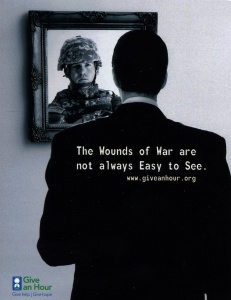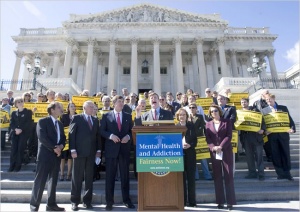May 10th, 2009 by Joseph Banken, Ph.D. in Better Health Network, Health Tips
No Comments »

Web pages and blogs are full of gift idea do’s and don’ts for your mother. I won’t go there. I think the topic has been covered quite nicely by better shoppers than I could ever hope to be.
You’ve also, no doubt, been bombarded with the plethora of tear jerker emails cautioning you to spend time with your mother while you can. She’s older than you, you know, and may not last until next year for you to make it up to her if you miss this Mother’s Day. That topic’s been covered too.
I’d like to talk with you a little bit about how to get through Mother’s Day after you’ve lost your mother. And I especially don’t want to forget the reverse situation; how to cope with Mother’s Day if you have lost a child, the hardest pain of all to overcome.
So how do you survive this Sunday if half of the equation is missing? You could hide under the covers until Monday. The protective property of the blanket works for monsters under the bed, why not against monsters of the heart as well? You could ignore that the day has any other meaning and treat it like any other Sunday, but that tends to backfire with a nasty trap of emotions smacking you back into reality the hard way at the worst possible time. Don’t let it catch you off guard; the day is coming whether you are ready for it or not. Or you could cry in your beer (over 21, please), but that just makes your eyes red and dilutes the beer.
Here are some coping strategies for bereavement:
- Talk about it with a friend or family member you trust to handle the sensitive and powerful emotions you feel towards Mother’s Day
- Realize that Mother’s Day is only one day out of the year and it has been commercially blown out of proportion and this too shall quickly pass
- Be around friends who understand and can help you cope with the day
- Acknowledge it can be a hard day and distract yourself with a movie or something that has a positive and endearing memory of what this day was initially designed to represent
And remember that your mother will always be your mother no matter where she is. And the same goes for mothers who have lost children. Once a mother, you will always be a mother even if you can no longer hold them in your arms.
If you are an eDocAmerica participant, you can send a message to the ePsych Psychologist for individualized coping strategies. Many people use this helpful option with good results whether it’s Mother’s Day or not.
All comments welcome.
*This blog post was originally published at eDocAmerica*
April 29th, 2009 by Paul Auerbach, M.D. in Better Health Network, Health Tips
3 Comments »
 In continuing with the theme of getting ready for the beach and water sports this summer, let’s consider what to do about substance abuse. There is no controversy whatsoever about the fact that persons under the influence of alcohol or any other mind-altering substance have a higher incidence of accidents. In fact, ingestion of alcohol figures prominently as a statistic in falls, drownings, motor vehicle accidents and virtually every variety of activity that has ever been studied. The issue, then, is not whether or not alcohol contributes to illness and injury, but to what extent we are able to control its use by reason and, when necessary, prohibition.
In continuing with the theme of getting ready for the beach and water sports this summer, let’s consider what to do about substance abuse. There is no controversy whatsoever about the fact that persons under the influence of alcohol or any other mind-altering substance have a higher incidence of accidents. In fact, ingestion of alcohol figures prominently as a statistic in falls, drownings, motor vehicle accidents and virtually every variety of activity that has ever been studied. The issue, then, is not whether or not alcohol contributes to illness and injury, but to what extent we are able to control its use by reason and, when necessary, prohibition.
Im June of 2008, Solana Beach, California banned alcohol consumption on its beaches for at least a year. This ban continues. Here is what appears on the city’s website:
Alcoholic Beverages – Alcohol is banned at all beach areas in Solana Beach. Alcohol is also prohibited in the parking lot, community center, viewpoint or any other public place adjacent to the beach. Glass is prohibited as well.
There are similar rules at, among others, Torrey Pines State Beach, Cardiff, San Elijo, South Carlsbad and Carlsbad state beaches.
City officials made this move proactively, to avoid the sorts of tragedies and social problems that have intermittently plagued “wet” beaches. Recognizing that judgment is often an irrelevant factor when it comes to drinking alcohol, they made a strong and, in my opinion, laudable move. Like it or not, judgment is impaired by drinking alcohol, so the concept of “responsible drinking” is an oxymoron when water sports and potentially hazardous surf conditions coexist with beer, wine, and liquor. Of course, the same is true for certain prescription drugs and illicit drugs.
Needless to say, civil libertarians and numerous other individuals are opposed to mandated prohibitions. They cite lack of observation of problems, principles of freedom and personal rights, and even the loss of romanticism. The issue obviously has two sides.
From a safety perspective, it’s a no-brainer. There’s no benefit to drinking alcohol and entering the ocean. It can never make you safer, and can only make you less safe. Even if you are able to drink alcohol at the beach and safely dispose of your metal cans and glass bottles, not litter, not be rowdy or obnoxious, and keep your drinking to yourself, the moment you dip a toe, you are a greater risk to yourself and to the lifeguards and other rescuers entrusted to protect you. You may not believe that to be the case, but the stories and statistics don’t support you. Having pulled intoxicated victims from the water, treated them at the scene, stitched their heads and set their broken bones in the emergency department, and having had to tell their families and friends that they are dead (while knowing that none of this would have ever happened had the victims been sober), I am offering well-intentioned advice. Not every city will mandate that you leave your beer cooler at home when you head to the beach. When you need to be the one to decide, choose wisely.
Preview the Annual Meeting of the Wilderness Medical Society, which will be held in Snowmass, Colorado July 24-29, 2009.
Join me from January 24 to February 2, 2010 for an exciting dive and wilderness medicine CME adventure aboard the Nautilus Explorer to Socorro Island, Mexico to benefit the Wilderness Medical Society.
photo courtesy of www.aquaticsafetygroup.com
*This post, Alcohol At The Beach, was originally published on Healthline.com by Paul S. Auerbach, MD, MS.*
November 10th, 2008 by Dr. Val Jones in News, Opinion
2 Comments »
“My daddy’s in Iraq, but he’s not dead yet.”
— 5-year-old son of a US Marine
Roughly 1.7 million Americans have been deployed to Iraq so far. An estimated 320,000 US military have received a traumatic brain injury in the Iraq war. Another 300,000 suffer from major depression or post traumatic stress disorder. The VA is not equipped to handle the mental health needs of all returning veterans and their families. What can we do?
The Give An Hour organization has challenged mental health professionals to donate 1 hour of their time/week to serve the needs of the military. If only 1 in 10 providers joined the program, there would be enough hours to cover the unmet needs.
I met with Dr. Barbara Romberg today to discuss her plans for the program. She envisions an in-office, phone, and online platform for Give An Hour. I sure hope that I can help out with the online platform one day.
If you’re a mental health professional, please consider joining the Give An Hour initiative. Our troops risked their lives for us, and others have sustained life-long injuries – some visible, some invisible.
And there are little boys out there, wondering if this is the day their daddy will die.
Let’s consider how we can be of comfort to those who are suffering on this Veterans Day.
October 12th, 2008 by Dr. Val Jones in Opinion
3 Comments »
I wrote a “reader take” for KevinMD a few weeks ago – basically arguing that disparities in mental health coverage are driving patients to seek help from unqualified (or inappropriate) providers, thus increasing healthcare costs without improving outcomes. Little did I know (at the time of writing my article) that mental health advocates would be successful in introducing a new law to address exactly this issue. The New York Times reported that some were hailing this legislation as:
A milestone in the quest for civil rights, an effort to end insurance discrimination and to reduce the stigma of mental illness.
And guess how this legislation was passed? It was the “pork” in the Wall Street bailout bill.
Now that’s some of the best pork I’ve heard of in recent memory.
To read my explanation of why improved mental health benefits are desperately needed, please check out my reader take at KevinMD. It’s called: How Not To Revolutionize Healthcare.
P.S. The delay in publication of my reader take was not Kevin’s fault. It was due to circumstances beyond our control. 🙂
August 19th, 2008 by Dr. Val Jones in News
8 Comments »
A small research study suggests a link between depression and poorer driving test scores. In fact, there also seemed to be a dose-response relationship with anti-depressants. In other words, the study subjects on the highest doses of anti-depressents got the lowest driving test scores.
Since depression can impair one’s concentration – the link is certainly plausible. I thought it was interesting that anti-depressants seemed to increase the risk for low scores. One would hope that those on anti-depressants were less symptomatic, but it’s also possible that the dosage correlated somewhat with the severity of the disease.
Drivers with conditions that could impact their driving abilities (such as epilepsy or stroke) should report their impairments to the DMV. Will the list of reportable impairments eventually include depression? I doubt it, but it is reportable to the Vehicle Licensing Agency in England.
On the spectrum of risk factors for sloppy driving, I wonder where depression stands?
- Cell phone usage
- Advanced age
- Driving in a foreign country
- Driving while eating/drinking
- Driving while intoxicated
It would be neat to see these risk factors compared to one another on a graph. Has anyone seen such a thing?This post originally appeared on Dr. Val’s blog at RevolutionHealth.com.
















